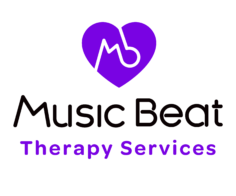Music Therapy in Early Childhood
Early childhood is the period from birth to eight years old and is a time of remarkable growth and brain development. During this stage, children learn holistically, meaning that social, emotional, cognitive, language, and physical lessons are learned from the whole experience.
In typically developing babies and toddlers, music therapy is used to enhance and develop socialisation, communication, self- expression, and sensory-motor skills.
It does this by encouraging a child’s development through activities such as singing, instrumental play, movement, songwriting, sensory play and relaxation to music.
Music therapy provides opportunities for children to achieve sensory integration and emotional regulation; to develop their communication and social skills and encourage general development through musical play.
One of the reasons music therapy works so well with children is that it gets their brains and bodies working while they are having fun, building a solid and broad foundation for lifelong learning and wellbeing.
Music Therapy in Early Childhood Intervention
Early Childhood Intervention provides specialised support for babies and toddlers with developmental delays, disabilities or additional needs, and their families.
It is about taking action as early as possible to support children and families in order to promote development, well-being and community participation.
Music therapy can be very effective in early childhood intervention, particularly for families who have a child with a disability.
Research shows that music therapy can provide important therapeutic benefits for families in the areas of early parenting, child development and maternal wellbeing.
General goal areas for music therapy in early childhood and early intervention include:
- Gross and fine motor control
- Communication
- Age appropriate social skills
- Attention and focus
- Following instructions
- Body awareness & self-regulation
- Sensory integration
- Age appropriate concepts
- Basic literacy & numeracy
Music Therapy for School Aged Children
Music therapy can be very beneficial for school aged children with additional needs.
It can be used in conjunction with the child’s school curriculum, to aid students in social situations, to allow self-expression, and to regulate emotions and sensory processing in a school environment.
Children who participate in music therapy will have an individualised plan that is set by the Registered Music Therapist in collaboration with parents and other therapists.
Music therapy can be used for:
- body awareness and sensory integration
- speech & language
- sequencing & memory
- social skills
- increased attention control
- literacy
- numeracy
- self-expression
- motor planning
- concepts
- improved mental health
- education themes
